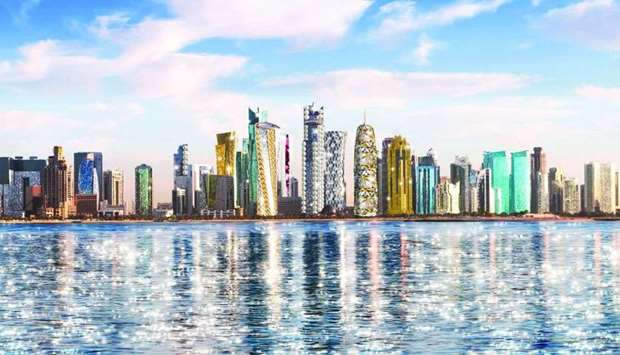Qatar’s economy has successfully absorbed the shocks from the 2014-16 drop in hydrocarbon prices and the continuing diplomatic rift, according to the International Monetary Fund (IMF).
The country has managed to retain export ties and develop newer trade relations, sustaining its one-third share of global liquefied natural gas (LNG) trade, the Bretton Woods institution said in its latest Article IV consultation report with Qatar.
"Overall GDP (gross domestic product) growth is projected to reach 2.6% in 2019 from 2.2% in 2018, underpinned by a recovery in the hydrocarbon output and still robust growth of the non-hydrocarbon sector," it said.
The projected non-hydrocarbon growth for this year reflects the lingering multiplier effects of sustained increases in capital expenditures in the last few years, the gradual pace of fiscal consolidation, ample liquidity, and increased private sector activity, it said, adding medium-term growth will be supported by increased gas production from the Barzan field, a planned increase in LNG production capacity by 40%.
The IMF report said inflation is projected to peak at 3.7% in 2020 with the introduction of a valued added tax, but converge to 2% in the medium term.
Highlighting that fiscal consolidation is envisaged to continue, albeit at a slower rate; it said in 2019, expenditure restraint and lagged revenue impact of higher oil prices would result in further improvement of fiscal position to about 3% from 2.3% in the previous year.
Over the medium term, the fiscal position would be in moderate surplus due to broadly stable hydrocarbon prices and sustained expenditure control, according to the IMF.
"A current account surplus of about 4.6% of GDP is envisaged for 2019 in line with the projected oil prices, and slower import growth than GDP. Over the medium term, the current account would be in modest surplus," it said.
Stressing that a robust medium-term fiscal framework would bolster fiscal policy credibility, it said strengthening fiscal policy frameworks is vital to averting pro-cyclicality, mitigating risks and ensuring inter-generational equity.
Finding that lower-than-projected hydrocarbon prices constitute the main risk to the macro-financial framework, IMF said they would translate into “deterioration" in the external and fiscal positions and a higher public debt.
Rising trade and geopolitical tensions could undermine investor confidence and weaken fiscal and external positions, it said, adding "Qatar is well placed to contain adverse macro-financial implications of downside risks, reflecting substantial buffers and prudent policies."
Structural reforms with emphasis on private sector-led growth and economic diversification would help support a more inclusive growth, the report suggested.
(Qatari) authorities’ reform agenda pertaining to the business environment, special economic zones, labour law, increased foreign ownership limits and privatisation is welcome, it said, adding while special economic zones can be helpful in the short term, they should not constitute an alternative to economy-wide structural reforms.
The IMF suggested that domestic and export-market competition should be used as benchmarks to hold beneficiaries of government’s support accountable.
Policy measures that focus on further improving the business environment, including improved contract enforcement and enhanced strengthened competition through reform of the insolvency mechanism, would buoy private sector-led growth, it said; adding laws that focus on ensuring equal remuneration and support gender equality would support inclusive growth.


